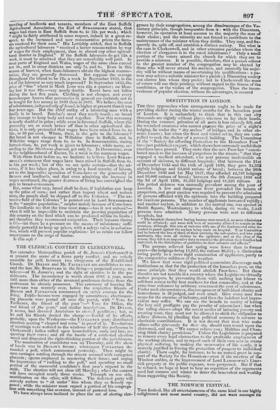THE CLERICAL CONTEST IN CLERKENWELL.
THE extensive Metropolitan parish of St. James's Clerkenwell is at present the scene of a fierce party conflict, and an unholy scramble for pelt; between two clergymen of the Established Church. Dr. Duero,: and Mr. FAULRENER are candidates to suc- ceed the late Mr. SHEPPARD in the living—a perpetual curacy, we believe—of St. James's ; and the right of election is in the pa- rishioners. The incumbency is worth about 600/. a year, some 1001. more than either of the reverend gentlemen derives from the preferment he already possesses. T he ceremony of burying Mr. SHEPPARD was scarcely over, betbre the respective friends of Dm!.ON and FAULKENER commenced an active canvass for the living. Public-houses were engaged by committees ; electioneer- ing placards were posted all over the parish, with " Vote for Faulkencr, the friend of the poor "—" Vote fbr Dillon, the real friend of the poor," and similar inscriptions. Dr. DILLON, it seems, had devoted Arminians to etereel perdition ; but, as he and his friends denied the charge — fearful of its effects, probably, upon the Wesleyans—the FerresENER party distributed circulars quoting 44 chapter and verse" in proof of it. Resolutions of meetings were watered to the windows of half the pothouses in Clerkenwell ; ladies called upon householders, early and late, re- questing their votes ; and all the bustle of a contested election vexed and disgusted the right-thinking portion of the parishioners. The nomination of candidates was on Thursday, and the show of hands was in Diresoe's favour • whereupon 'PAUL/it:NEB de- manded a poll, which commenced yesterday. Then might be seen carriages rattling through the streets covered with variegated placards ; agents employed in mustering their tbrcee, and urging the importance of " rushing to the poll," and spending no small portion of the successful candidate's first year's stipend in the strife. The election will not close till Monday; when the contest will have occupied nearly three weeks. Triumph on one side, mortification on the other, will follow. The defeated party will scarcely endure to " sit under" him whom they so fiercely op-
posed ; while the miuister must regard a portion of his emiercea - 0 tion with something like aversion, instead of pastoral love. We have always been inclined to place the act of electing clerk
gymen by their congregations, among the disadvantages of the Vo- luntary principle, though inseparable from it : with the Dissenters, however, its operation at least secures to the majority the man of their choice; and the minority are not forced to contribute to the maintenance of the minister whom they dislike. They may, and fre- quently do, split off, and establish is distinct society. But what is. the case in Clerkenwell, mid in other extensive parishes where the election of clergymen is in the rated inhabitants ? Only a mall. portion of the voters attend the church for which they are to provide a minister. It is possible, therefore, that a person odious to the greater number of the congregation may be elected by those who will never attend his services, and assuredly his majo- rity will be without means of ascertaining his qualifications : a pa, tron may select a suitable minister for a parish ; a Dissenting society can choose him whom they prefer; but in Clerkenwell the mass of voters will use their privilege without regard to the fitness of the candidates, or the wishes of the congregation. Thus the incon- venience of popular election, without its advantages, is secured


























 Previous page
Previous page